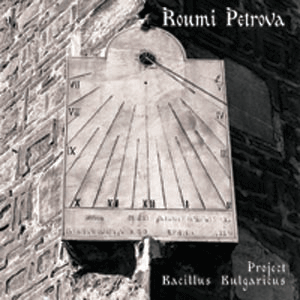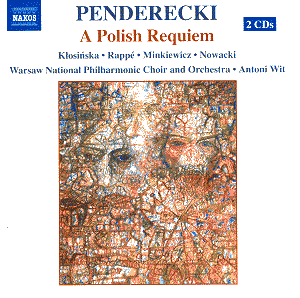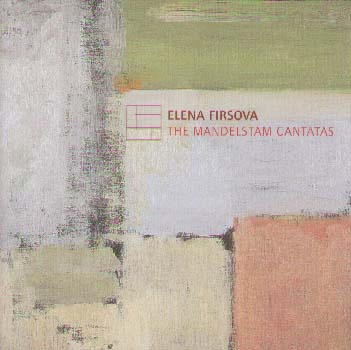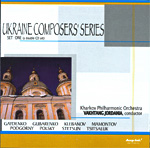| Record companies, artists and publicists are invited to submit CDs to be considered for review. Send to: Jerry Bowles, Editor, Sequenza 21, 340 W. 57th Street, 12B, New York, NY 10019 |
Latest Posts
Ernst Pepping and Allan Pettersson: Moral Dilemmas in Symphonic Music
"The numbers all go to eleven. Look, right across the board, eleven, eleven, eleven and... "
Tell the Birds
Soundtrack to an Apocalypse
Feast Your Ears: New Music for Piano
Gone For Foreign
Fred Lerdahl: Time After Time
Nothing Sacred
Two From Wayne Horvitz
Two Fresh Cantaloupes
Record companies, artists and publicists are invited to submit CDs to be considered for our Editor's Pick's of the month. Send to: Jerry Bowles, Editor, Sequenza 21, 340 W. 57th Street, 12B, New York, NY 10019



|
Archives
Saturday, December 18, 2004
Saturday, December 25, 2004
Friday, December 31, 2004
Wednesday, January 05, 2005
Monday, January 10, 2005
Thursday, January 13, 2005
Thursday, January 20, 2005
Sunday, January 23, 2005
Monday, January 24, 2005
Saturday, January 29, 2005
Wednesday, February 02, 2005
Thursday, February 03, 2005
Monday, February 07, 2005
Tuesday, February 08, 2005
Friday, February 11, 2005
Monday, February 14, 2005
Wednesday, February 16, 2005
Tuesday, February 22, 2005
Monday, February 28, 2005
Sunday, March 06, 2005
Monday, March 07, 2005
Wednesday, March 09, 2005
Sunday, March 13, 2005
Friday, March 18, 2005
Monday, March 28, 2005
Saturday, April 02, 2005
Monday, April 11, 2005
Sunday, April 17, 2005
Tuesday, April 19, 2005
Monday, April 25, 2005
Monday, May 02, 2005
Monday, May 09, 2005
Tuesday, May 17, 2005
Tuesday, May 31, 2005
Monday, June 06, 2005
Thursday, June 16, 2005
Sunday, June 19, 2005
Sunday, July 10, 2005
Wednesday, July 13, 2005
Sunday, July 24, 2005
Friday, July 29, 2005
Monday, August 08, 2005
Monday, August 22, 2005
Wednesday, August 24, 2005
Friday, September 16, 2005
Sunday, September 25, 2005
Tuesday, October 04, 2005
Tuesday, October 18, 2005
Monday, October 24, 2005
Tuesday, November 01, 2005
Monday, November 07, 2005
Saturday, November 12, 2005
Wednesday, November 16, 2005
Tuesday, November 29, 2005
Friday, December 16, 2005
Monday, January 09, 2006
Thursday, January 12, 2006
Thursday, January 19, 2006
Tuesday, January 24, 2006
Thursday, February 02, 2006
Monday, February 13, 2006
Wednesday, February 15, 2006
Wednesday, March 01, 2006
Sunday, March 19, 2006
Sunday, March 26, 2006
Friday, March 31, 2006
Sunday, April 09, 2006
Monday, April 10, 2006
Thursday, April 20, 2006
Friday, April 21, 2006
Thursday, May 11, 2006
Thursday, May 18, 2006
Saturday, May 20, 2006
Friday, June 02, 2006
Tuesday, June 06, 2006
Friday, June 16, 2006
Monday, June 19, 2006
Sunday, June 25, 2006
Monday, June 26, 2006
Monday, July 10, 2006
Thursday, July 13, 2006
Thursday, July 20, 2006
Friday, July 21, 2006
Sunday, July 23, 2006
Thursday, August 03, 2006
Wednesday, August 09, 2006

|
|
Sunday, June 19, 2005
New Music From Eastern Europe
N.B. Ratings from 0-11. 0 for resembling life under Communist dictatorships, 11 for life under freely-elected Democratic governments.
 Petrovart: Roumi Petrova, Project Bacillus Bulgaricus Petrovart: Roumi Petrova, Project Bacillus Bulgaricus
Roumi Petrova is a violist and composer hailing from Bulgaria who now lives in New York. Trained in her native country as a classical musician, her first serious exposure to Bulgarian folk music came only when she turned to composition in her early twenties. Petrova is a member of the Forte String Quartet, and she seems to center her composing activities around the group. While seeking to strike a balance between "folk" and "classical" elements, her compositions unfortunately bear little of the raw energy that makes for exciting folk music, and little of the imagination that makes for exciting classical work. Itís all pretty tame, and the performances for the most part reflect this lack of musical energy. Rating: 5.
 A Polish Requiem (2 CDs) A Polish Requiem (2 CDs)
Krzysztof Penderecki
Naxos
A searing articulation of the sufferings of Poland in the twentieth century, Pendereckiís sprawling "A Polish Requiem" took the composer thirteen years to write and almost as long to get on CD. The result is an almost unqualified triumph. Adopting a theatrical approach to the text that recalls Verdiís Requiem, Penderecki whips up the orchestra, chorus, and soloists into climaxes of frightening and ferocious intensity. With a seemingly unlimited pallet of sonority and color, he marches the listener through vast landscapes of agonizing dissonance and blissful consonance Ė somehow managing to hold the work together through clear inter-movement motivic connections and the recurrence of the hymn "?wi?ty Bo?e" (Holy God). Arresting moments for percussion as well as vocal and instrumental solos keep the timbrel profile of the music fresh, and Pendereckiís detours into the avant garde techniques that made him famous feel purposeful and seamlessly integrated into the whole. This is the closest thing Iíve reviewed all year to a must-have. Rating: 10.
 The Mandelstam Cantatas The Mandelstam Cantatas
Elena Frisova
Megadisc
Frisova (b.1950) is a Russian composer whose works were looked down upon by the Soviet regime, but who now is getting a chance to sing. This disc presents three song cycles for soprano and chamber ensemble based on poems by Oleg Mandelstam. Frisova resembles Schnittke in her free (and sensitive) use of tonality, but her music has a fantastic bent to it one normally doesnít associate with the latter composer. She has a wonderful gift for tone color and her harmonies break out into lovely and well-earned major and minor triads. But everything is slow and soft: more rhythmic energy and fewer languorous textures would have made this collection more enthralling. Still, there is much to enjoy. Rating: 8.
 Ukraine Composersí Series, Set One (2 CDs) Ukraine Composersí Series, Set One (2 CDs)
Angelok
Angelok 1 presents a two-CD set of orchestral music by a half-dozen Ukrainian composers all of whom, for some reason, have ties with the city of Kharkov in western Ukraine. Most of the pieces are utterly forgettable, but itís unclear whoís really responsible. The represented composers were all born before 1950 and doubtless had to work for most of their careers within the confines of Soviet aesthetics. They likely had little exposure to post-1950 musical developments in the West, and musical experimentation Ė even of a modest degree Ė would have been frowned upon. On the other hand, most of these composers are still living, and the program notes do not say when any of the compositions were written. Perhaps some of them are post-Soviet. Whatever the reasons, the first CD dishes up piece after piece of hackneyed bombast and warmed-over lyricism. Itís hard to imagine feeling passionately about any of it. Disc Two is better. Vitaly Gubarenkoís (b. 1934) Chamber Symphony No. 2 and "Choreographic Scenes from ĎZaporozhtsyí" have far and away more energy and imagination than anything else on the collection. Overall, however, music in Kharkov for the last few decades seems to have been a pretty sad story. Ratings: Disc One, 5; Disc Two, 8.
posted by David Salvage
10:12 PM
|
|




